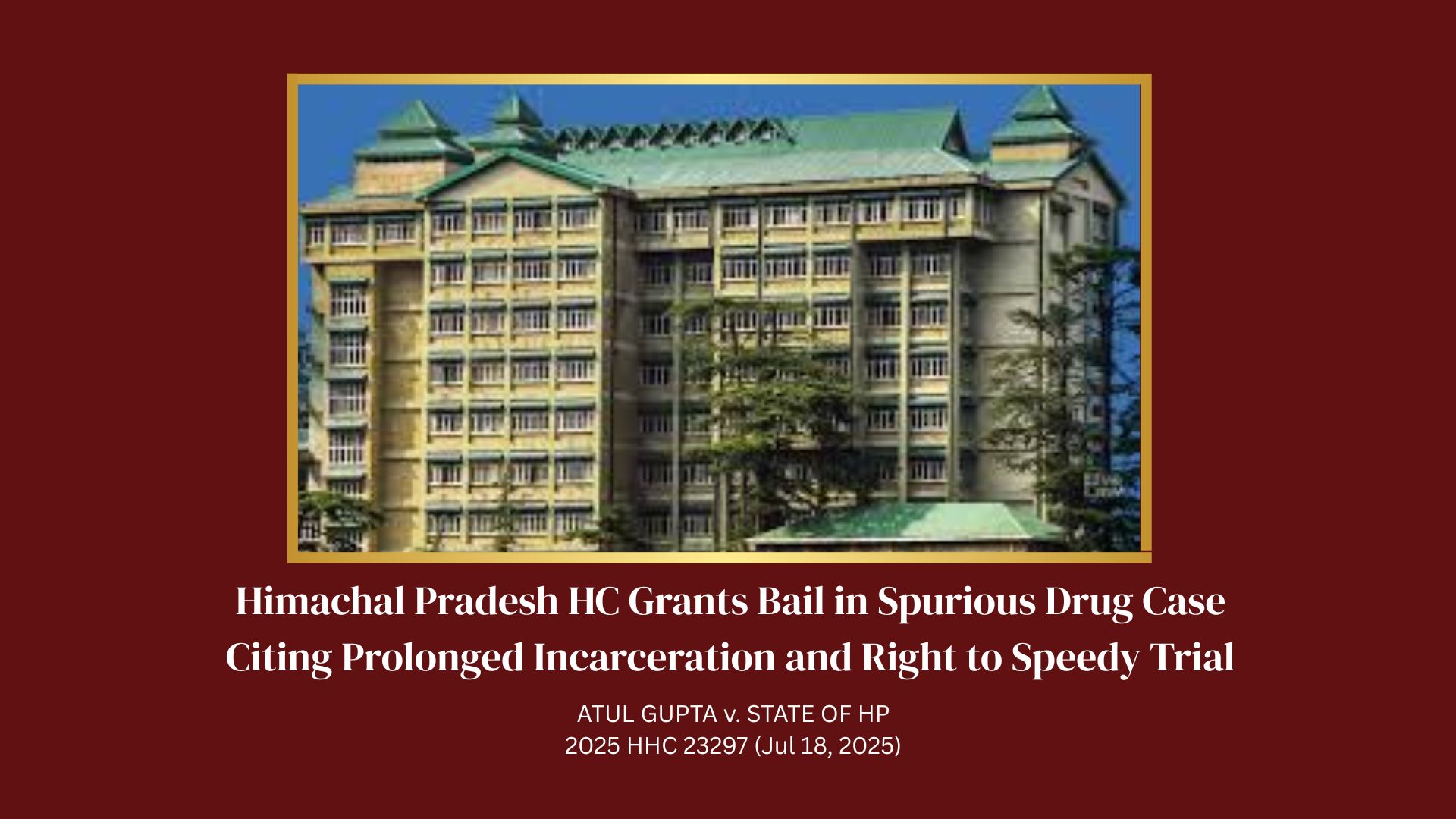
Himachal Pradesh HC Grants Bail in Spurious Drug Case Citing Prolonged Incarceration and Right to Speedy Trial
ATUL GUPTA AND ANR. v. STATE OF HIMACHAL PRADESH
2025 HHC 23297
Jul 18, 2025
In this case, a complaint was registered on 22.11.2022 on information that the accused were involved in the manufacturing of spurious drugs from his manufacturing premises, which is situated near at Baddi, HP. Information Huge stock of spurious medicines was recovered by the Drugs Inspector from during the course of search and more searches were conducted at godowns and residences linked to the accused, large quantities of spurious medicines, raw materials, packaging materials, and manufacturing equipment were seized.
The accused could not produce any licence/ authorization for the aforesaid spurious medicines and were arrested on the same day. Further, bail applications had been filed by the petitioners on the ground that they are innocent and have been falsely implicated in the case. The petitioners in this case are Atul Gupta is in judicial custody since 22.11.2022, and petitioner Surender Malik who is in judicial custody since 11.9. 2024. The trial progressed slowly with only 5 out of 82 witnesses examined, indicated inordinate delay.
It was argued by the petitioners that the main accused from whom spurious drugs were recovered and other co-accused persons have already been released on bail by the Coordinate Benches of the Court, as such, the petitioners also deserved to be released on bail on the ground of parity.
On the other hand, Respondent (the State) opposed the bail application on the ground that the petitioners do not deserve to be released on bail as they were found involved in a serious offence of manufacturing of the drugs, which were found spurious.
Decision
The High Court observed that Article 21 of the Constitution of India guarantees for speedy trial and an undertrial prisoner cannot be detained in jail/custody for an indefinite period. The Apex Court has consistently held that the undertrials cannot be allowed to languish for years together in jail, while the trial proceed very slowly As quoted under:
Para 15 “It is well settled that Article 21 of the Constitution of India guarantees for speedy trial and an undertrial prisoner cannot be detained in jail/custody for an indefinite period. The Hon'ble Supreme Court has consistently held that the undertrials cannot be allowed to languish for years together in jail, while the trials proceed at snail's pace. If ultimately, the accused is found to be not guilty, the number of years, months and days spent by such accused as undertrial in jail, can never be given back to him and this is certainly a violation of his valuable right under Article 21 of the Constitution of India.”
The High Court referred to the Judgment of Abdul Rehman Antulay & Ors. vs. R.S. Nayak
& Anr., (1992) 1 SCC 225 wherein, the Supreme court held that right to speedy trial is part of fair, just and reasonable procedure implicit in Article 21 and is reflected in Section 309 Cr. P.C. and that the said right comprehends all stages viz., investigation, inquiry, trial, appeal, revision and retrial. The relevant para is quoted as under:
Para 81: “Article 21 declares that no person shall be deprived of his High Court of H.P. life or liberty except in accordance with the procedure prescribed by law. The main procedural law in this country isthe Code of Criminal Procedure, 1973. Several other enactments too contain many a procedural provision. After Maneka Gandhi v. Union of India (AIR 1978 SC 597), it can hardly be disputed that the 'law' (which has to be understood in the sense the expression has been defined in clause (3)(a) of Article 3 of the Constitution) in Article 21 has to answer the test of reasonableness and fairness inherent in Articles 19 and 14. In other words, such law should provide a procedure which is fair, reasonable and just. Then alone, would it be in consonance with the command of Article 21. Indeed, wherever necessary, such fairness must be read into such law. Now, can it be said that a law which does not provide for a reasonably prompt investigation, trial and conclusion of a criminal case is fair, just and reasonable? It is both in the interest of the accused as well as the society that a criminal case is concluded soon. If the accused is guilty, he ought to be declared so. Social interest lies in punishing the guilty and exoneration of the innocent but this determination (of guilt or innocence) must be arrived at with reasonable despatch- reasonable in all the circumstances of the case. Since it is the accused who is charged with the offence and is also the person whose life and/or liberty is at peril, it is but fair to say that he has a right to be tried speedily. Correspondingly, it is the obligation of the State to respect and ensure this right. It needs no emphasis to say, the very fact of being accused of a crime is cause for concern. It affects the reputation and the standing of the person among his colleagues and in the society. It is a cause for worry and expense. It is more so, if he is arrested. If it is a serious offence, the man may stand to lose his life, liberty, career and all that he cherishes.”
The High Court further opined as under
Para 20-“From the foregoing enunciation of the law laid down by the Hon’ble Supreme Court, it becomes clear that long incarceration of an undertrial without any likelihood of conclusion of trial in near future infringes upon the right of speedy trial of such undertrial. Now adverting to the case at and, this court is conscious of the fact that the charges levelled against the petitioner are grave and serious. As observed earlier, petitioner Atul Gupta is behind the bars since 22.11.2022 and petitioner Surender Malik is behind the bars since 11.09.2024 and out of total 82 witnesses cited, till date only 05 witnesses have been examined and the trial is fixed for 4th & 5th September, 2025 for examination of only some of the witnesses. Hence, keeping in mind, the length of the period spent by the High Court of H.P. petitioners in custody and the unlikelihood of the trial being completed in near future, this Court appears to have been left with no other option except to grant them bail. The detention of the petitioners has virtually become pre-trial punishment to them. There is also nothing on record to suggest that the delay in trial is attributable to the petitioners. Therefore, having regard to the aforesaid facts, the petitioners cannot be kept behind the bars for an unlimited period as further incarceration of the petitioners would be violative of their right enshrined under Article 21 of the Constitution.”
Accordingly, the petitioners, were released on bail by the Court subject to their furnishing personal bonds to the tune of Rs. 2,00,000/-. The bail was granted by the Court subject to conditions including appearance before the Court and Investigating Officer, no inducement or threat to witnesses, no tampering with evidence, no repetition of offence, no delay in investigation or trial, and no leaving India without prior permission.
With the above-mentioned orders, the petition was disposed of.
Click here to access the full Judgment
Note:
Cases related to Pharmaceuticals are highly technical and knowledge-driven. If you're searching for a drugs and cosmetics lawyer in India, a pharmaceutical lawyer, Mace Corporate Associates is the perfect place. If you are searching for a DPCO Lawyer for overcharging cases or DPCO Compliance, Mace can assist you well.
May it be a clinical trial Lawyer or a Medical device lawyer, Mace can be of great and perfect match for Pharmaceutical litigation. Mace has an accomplished track record for Not of Standard Quality Cases, Licensing Cases etc.

